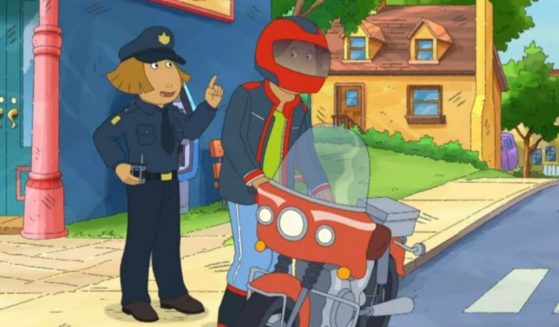
The final episode of the longest-running kids’ cartoon show revealed the grown-up lives of the show’s characters, and cop-haters are not happy with the fate of one animated girl.
“Arthur,” a series about Arthur the aardvark’s days with family and friends, has been a childhood favorite for countless people since it first aired in 1996. For some, the love goes back to 1976 — when the first book in the series that would inspire the show, “Arthur’s Nose,” was published.
All of this came to an apparent end Monday as the animated series aired its last episode ever.
While the characters will live on in other projects, the show is coming to a definitive close.
“Kids are our boss, and we listen to them,” Arthur’s original creator, Marc Brown, told the Los Angeles Times
“And that is one of the most often asked questions we got: ‘What happens to Arthur? What happens to Francine?’ And so it seemed like a logical gift to give these loyal viewers something that they really wanted.”
Not everyone was happy with the end these characters got.
Main character Arthur becomes a writer, while other pillars of the show take on jobs as schoolteachers, business owners and weathermen.
Arthur’s sister, D.W., becomes a police officer.
The Arthur characters are all grown up pic.twitter.com/6vmyYodWeB
— philip lewis (@Phil_Lewis_) February 21, 2022
Of course, not all fans of the show were happy to see an animated girl grow up to enforce the law as a traffic cop.
Responses ranged from people poking fun at fact that this character is known for snitching on her brother to rage-filled posts too vulgar to publish here.
Arthur ended today after a 25 year run and DW, the world renowned tattle tale, grew up to be a cop lmao pic.twitter.com/QuRlmCs5nX
— Saberspark (@Saberspark) February 21, 2022
DW becoming a cop is the least believable part of this. NAH. Not my girl! She would not. https://t.co/dUEJ6vVUXx
— Luvvie is the #ProfessionalTroublemaker (@Luvvie) February 21, 2022
Speaking to how the show addresses problems that kids may face, executive producer Carol Greenwald explained the thinking behind the series’ sometimes-complicated subject matter.
“We really want to acknowledge that kids live in this world,” Greenwald told the Times, “and the world that they live in is sometimes wonderful and sometimes not so great, and that we can’t protect kids from the things that are going on around them.”
While a minor detail in a much greater series, this small addition will give kids yet another healthy perspective of police on television.
